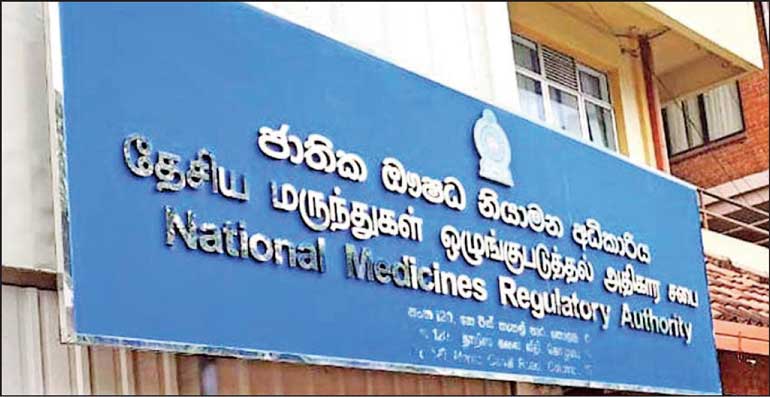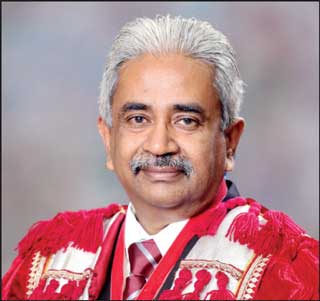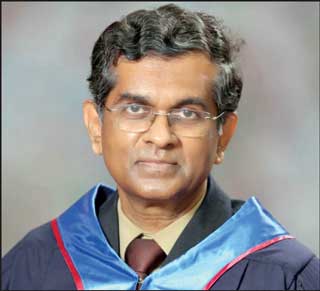Sunday Feb 22, 2026
Sunday Feb 22, 2026
Friday, 30 June 2023 00:19 - - {{hitsCtrl.values.hits}}

 |
| SLMA President Dr. Vinya Ariyaratne |
 |
| SLMA President Elect and Consultant Physician Dr. Ananda Wijewickrama |
 |
| Senior Advisor to the WHO and the Ministry of Health, Dr. Palitha Abeykoon |
By Randima Attygalle
The controversial Indian-manufactured anaesthetic ‘Zupivac-H’ which was procured through the Indian Credit Line which is alleged to have caused two deaths at the Peradeniya Teaching Hospital, drove the public to panic and question the safety of drugs and other medical supplies in the country. Making matters worse, Nuwara Eliya General Hospital recently reported several cases of visual impairment after administering certain Indian medication to patients following eye surgery. With the quality of imported drugs being questioned, National Medicines Regulatory Authority (NMRA) – country’s national drug regulator has come under fire. In this context, Sri Lanka Medical Association (SLMA), in a letter to President Ranil Wickremesinghe has raised its concerns about the quality of imported drugs and other medical supplies and the perils of wavering the registration of the same.
During the media briefing held yesterday about the current crisis in quality and shortage of drugs in the country, SLMA President Dr. Vinya Ariyaratne expressed his concerns about the violation of NMRA’s main objectives and improper constitution of its authority. Among the main objectives spelt out in the National Medicines Regulatory Authority Act of 2015 are to ensure the availability of efficacious, safe and good quality medicines, and medical device to the public and ensure that all activities related to registration, licensing and importation of medicines, medical devices, borderline products and investigational medicinal products are carried out in a transparent, sustainable and equitable manner. SLMA President pointed out that the recent violation of these objectives amounts to breach of trust by the national drug regulator and restoring that trust among the public will now be a challenging task. Moreover, the improper constitution of its authority puts the credibility of the entire process at stake, he said.
“The Act requires the representation of four clinical disciplines which include general medicine, general surgery, paediatrics and gynaecology and obstetrics. However, as of late only two disciplines are represented at NMRA making the input of technical knowledge questionable,” Dr. Ariyaratne observed.
Worldwide, the laws and regulations governing medicine have been formulated based on trust and breach of this trust is critical with dire consequences, pointed out the Senior Advisor to the WHO and the Ministry of Health, Dr. Palitha Abeykoon. SLMA Past President and NMRA former Chairman Dr. Abeykoon reiterated that stringent adherence to the provisions provided for the NMRA to assure quality of drugs cannot be compromised at any cost. The role played by NMRA’s pharmacists who have been extensively trained in this regard cannot be undermined, Dr. Abeykoon noted further.
NMRA pharmacists are responsible for evaluation of medicine, pharmacovigilance activity and other processes related to the safety of medicine including adverse reactions as well as coordination and licensing. They are also the WHO focal point for substandard and falsified medical products. NMRA pharmacists also contribute towards pricing decisions based on established parameters. The ‘unexpected’ and ‘unexplained’ transfer of NMRA’s 23 most experienced pharmacists a few weeks ago amidst protests by the Society of Government Pharmacists (SoGP) was a further kick in the teeth.
The processes related to drug safety now left in the hands of just 26 pharmacists at the NMRA, most of them who are junior, will lead to further crippling the functions of the NMRA, noted SLMA President Elect and Consultant Physician Dr. Ananda Wijewickrama. The emergency situation prevalent in the country with the shortage of drugs, 85% of which is sourced from India, is lamely used as an excuse to waive off registration by the NMRA, he charged. The controversial Indian-manufactured anaesthetic ‘Zupivac-H’ which was administered to the ill-fated patients at the Peradeniya Teaching Hospital was imported on a waiver of registration issued by the NMRA and the batch was found to be substandard.
“The waiver of registration by no means warrant substandard and unsafe drugs,” maintained Dr. Wijewickrama who went onto note that, despite the assurance given by authorities that drugs purchased through Indian Credit Line, ADB and World Bank facilities would be sufficient for the entire year of 2023, the reality is not so. There still remains a shortage of about 230 essential drugs. “Proper management of the funds obtained through these facilities and regulating the imported medicine is critical at this juncture, if the public trust is to be re-restored in the system,” maintained Dr. Wijewickrama.